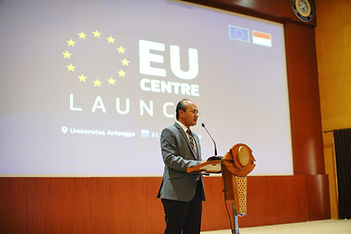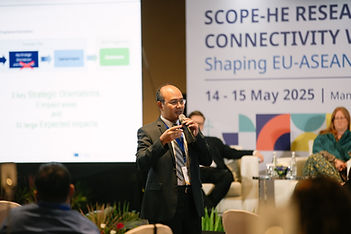Bridging Minds
Dr. Brotosudarmo, a recipient of the Georg Foster Fellowship from the Alexander von Humboldt Foundation, brings over 20 years of leadership in research management, internationalisation, and science communication. Committed to science diplomacy and “connecting people, transforming society,” he aims to bridge ASEAN’s brightest minds with the global academic landscape. By fostering vibrant research communities and facilitating strategic dialogues, he promotes research excellence and international collaboration. His work plays a key role in driving societal transformation, extending the impact of science, and contributing to a sustainable future.
The Power of Science Diplomacy in Addressing Global Challenges

In an increasingly interconnected world, pressing global issues such as climate change, health crises, and food security require international cooperation. From my experience, science diplomacy plays a vital role in fostering this cooperation, building trust, and developing innovative solutions that go beyond national borders. It provides a platform where scientists, policymakers, and governments can collaborate effectively to solve problems that affect the entire planet.
Understanding Science Diplomacy
Science diplomacy can be divided into four types: (1) Science in Diplomacy, (2) Diplomacy in Science, (3) Diplomacy for Science, and (4) Science for Diplomacy. Among these, “Science for Diplomacy” is especially impactful because it emphasises using scientific networks to foster trust and strengthen relations between countries. These networks serve as foundational platforms for broader cooperation, enabling nations to work together on scientific projects, share expertise, and address common global challenges.
Horizon Europe: A Model of Science Diplomacy
The European Union’s Horizon Europe program exemplifies how science diplomacy can function in practice. With a substantial budget dedicated to research and innovation, it has funded thousands of projects that address critical issues such as health, climate change, and energy. Its emphasis on international collaboration encourages researchers from diverse backgrounds and regions to form multidisciplinary consortia. This approach not only accelerates the development of impactful solutions but also promotes responsible research and transparency principles like open science and gender equality.
The program’s focus extends beyond immediate research outputs; it aims to develop sustainable technological solutions that benefit society at large. Researchers working across borders—sharing knowledge and resources—build mutual trust, which further strengthens international relations. Importantly, Horizon Europe fosters the mobility of scientists, helping to create a truly global scientific workforce capable of tackling long-term challenges like antimicrobial resistance or climate adaptation.
The Role of Scientists from the Global South
Scientists from regions in the Global South have a significant role to play in global science diplomacy. Through participation in international frameworks like Horizon Europe, they can contribute to solving worldwide problems and promote sustainable development. Such involvement helps bridge knowledge gaps, expand research capacities, and develop innovative approaches tailored to local contexts.
However, these scientists face barriers such as limited funding, inadequate infrastructure, political tensions, and weak integration between science and foreign policy. Overcoming these obstacles requires a concerted effort to strengthen research institutions, foster international partnerships, and embed science diplomacy strategies into national and regional policies. Building capacities and promoting equitable participation in global research networks are essential steps to ensure that all regions can contribute effectively.
Strengthening Asia-Europe Scientific Cooperation
To advance science diplomacy between Asia and Europe, existing collaborations like Horizon Europe can provide valuable models. These programs foster trust and knowledge exchange through joint research projects, researcher exchanges, and policy dialogues that build long-term relationships. Expanding these platforms and strengthening regional research networks can help address shared challenges such as climate change, pandemics, and sustainable development.Academic institutions and research organizations play a crucial role in this process. They act as bridges between nations, facilitating collaboration and knowledge transfer. Investing in research infrastructure, promoting leadership in science diplomacy, and nurturing future generations of scientists and policymakers are essential to deepen cooperation and enhance regional capacity. Incorporating science diplomacy into university curricula and professional development initiatives can prepare young leaders to operate effectively at the intersection of science and international relations.
Conclusion
Science diplomacy is more than just scientific exchange; it is a powerful tool for building trust, fostering collaboration, and addressing global challenges through collective effort. Initiatives like Horizon Europe demonstrate that strategic, inclusive, and responsible scientific cooperation can drive technological innovation and promote peace and understanding among nations. Strengthening regional and bilateral science diplomacy, especially between Asia and Europe, will enable more effective responses to shared crises and unlock the full potential of global scientific collaboration. Through continued investment in institutions, capacity building, and fostering international partnerships, we can harness the transformative power of science diplomacy to create a more sustainable, resilient, and interconnected world.
To follow his role, please click here: EURAXESS ASEAN



Humboldt Kolleg – Translates Southeast Asia
Transformations in addressing climate change and sustainability challenges in Southeast Asia
The Humboldt Kolleg – Translate Southeast Asia was held from September 18 to 21, 2024, in Surabaya, highlighting the escalating threat of climate change in Southeast Asia and underscoring the urgent need for collective action, innovation, and strategic collaboration. As one of the most vulnerable regions to the impacts of climate change, Southeast Asia faces devastating natural disasters, rising temperatures, sea level rise, and biodiversity loss. The event aimed to galvanise a regional network of researchers, policymakers, and community stakeholders to address these urgent challenges with a focus on transformative sustainability strategies.

One of the most striking aspects of this conference was its emphasis on the role of young researchers in driving societal change. With 77 Humboldtians, senior and junior researchers from Germany, Indonesia, Malaysia, the Philippines, Thailand, and Vietnam actively participating, the event recognised the importance of empowering the next generation of scientists and innovators. Engaging young minds in discussions about urban design, green economies, epidemiology, and sustainable development is critical for fostering innovative solutions tailored to regional contexts. The inclusion of early-career researchers highlights a strategic shift towards capacity building and the cultivation of leadership within local and regional communities.
The thematic discussions during the workshop revealed a clear consensus: tackling climate change in Southeast Asia requires an interdisciplinary approach that integrates traditional indigenous knowledge with modern science. Participants emphasised the importance of innovative sustainability practices, including the adoption of circular economies and resource efficiency. Such practices emphasise reducing waste and extending product lifecycles—a crucial step in minimising environmental footprints.
Investment in renewable energy sources emerged as another core theme. Southeast Asia's reliance on fossil fuels has exacerbated greenhouse gas emissions, making the transition to clean energy not just necessary but urgent. Panellists highlighted strategies like reforestation and emission capture technologies, emphasising that interdisciplinary and cross-sector collaboration is essential to develop comprehensive climate mitigation frameworks.

The role of universities as champions of sustainability was prominently discussed. Higher education institutions have a unique capacity to lead by example—adopting renewable energy, embedding sustainability into curricula, and fostering community engagement. These institutions can act as catalysts for societal transformation by cultivating a culture of sustainability among students and local communities. The conference’s strategies, such as establishing networks among researchers, policymakers, and private-sector stakeholders, aim to foster innovation, trust, and shared commitment to regional climate goals.
Furthermore, the inclusion of indigenous knowledge underscores an often-overlooked asset in climate resilience. Traditional practices, rooted in a deep understanding of local ecosystems, can complement scientific approaches, enhancing community resilience to climate shocks. This integration exemplifies how holistic, context-specific solutions are more sustainable and socially acceptable.
International collaboration was another key focus. Southeast Asia's climate challenges transcend national borders, demanding cross-border research alliances and joint development initiatives. By leveraging global expertise, local stakeholders can implement innovative solutions more effectively and ensure sustainable development that benefits all.
Despite the strides made during the Kolleg, the regional challenges remain daunting. Climate change is an urgent crisis that requires a sustained commitment, innovative thinking, and comprehensive action. The event’s success in establishing a vibrant, interconnected Humboldt network signals hope—and a pathway—toward more resilient, sustainable Southeast Asia. It reminds us that, in the face of existential threats, regional solidarity and shared knowledge are our best tools for transformation. The road ahead demands concerted effort, but initiatives like the Humboldt Kolleg illuminate a promising trajectory toward a more sustainable future.
Have a look at more information in the Humboldt Kolleg Indonesia 2024 Programme Book.
DIES Partnerships with Higher Education Institutions in Indonesia
Dr. Brotosudarmo has played a pivotal role in the DIES Partnership project (2020-2023) as a leading expert and strategic consultant, driving transformative change in the leadership and institutional management of four Indonesian universities. His efforts have revolutionised university governance through targeted management training, elevated pedagogic standards, and increased research productivity via innovative management practices. By restructuring administrative frameworks and fostering robust international collaborations, he cultivates a culture of excellence and long-term sustainability. His active engagement with both national and international experts empowers Indonesian higher education institutions to thrive, ensuring quality, innovation, and global competitiveness in higher education.
Publication:
Title: Menumbuhkan Budaya Unggul dalam Manajemen Universitas melalui Pengembangan Kepemimpinan dan Kemitraan
ISBN: 978-623-314-438-4
Published: 2023
Publisher: PBMR ANDI
